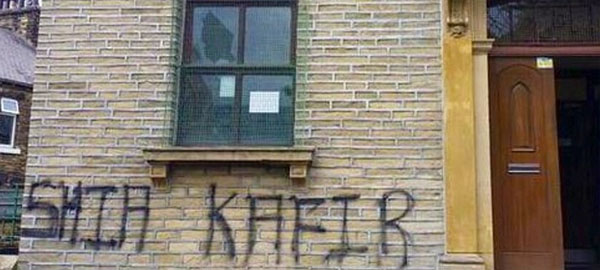Religious sectarianism is on the rise in Britain’s Muslim community and threatens to spill over into violent crime and terrorism, leading clerics warned yesterday.
An investigation by The Times has found a sharp but largely hidden rise in sectarian tensions between the minority Shia community and the dominant Sunni groups, driven by the long, bitter war in Syria.
Ill-feeling is being stoked by vitriolic preachers on both sides of the divide — including some who lecture at British universities — and incidents such as assaults, attacks on buildings and intimidation online.
Sayed Ammar Nakshwani, one of the world’s leading Shia clerics, revealed that he recently left Britain for the United States after enduring years of intimidation from hardline Sunnis who allegedly threatened his life, followed his parents and vandalised his car.
Sheikh Ahmed Haneef, a Shia imam in London, called for 24-hour police protection for Shia mosques and said that community leaders needed to step up security to guard against the threat of “blowback” from Islamic State sympathisers carrying out terrorist attacks.
Qari Muhammad Asim, a leading Sunni voice and imam at the Makkah mosque in Leeds, warned that sectarian rhetoric was “a cancer eating away at the Muslim community”.
He said: “Our faith doesn’t condone takfir [excommunication] of another. It is against Prophetic tradition and if we follow the same path as the Middle East, where sectarianism has fuelled conflict, we are in trouble.”
Of the 3 million Muslims in Britain, about 2.3 million identify as Sunni, compared with 300,000 Shias, or 5 per cent of the total. Most British Shias have roots in Iran, Iraq, Azerbaijan or Bahrain. Sunnis make up the vast majority of Muslims worldwide.
The sectarian atmosphere in Britain is being fuelled by propaganda that depicts the war in Syria as a battle between Sunni rebels and the Shia-led Assad regime. The regional power struggle between the Sunni kingdom of Saudi Arabia and the Shia republic of Iran is also having an impact.
Mr Haneef, of the Islamic Centre of England, a Shia mosque in north London, said that there was “a really major security issue” developing. “The venomous preaching combined with the jihadists coming back into the country and looking to carry out opportunist attacks — that puts us in a very dangerous situation,” he said.
His centre had experienced two recent incidents, one when an attempt was made to break down the front door and the second during Ramadan when two hardline Sunni Salafists tried to attack people outside the building.
Mr Haneef said: “We’re a soft target for opportunist terrorism. We have been ramping up security but I don’t think it’s enough — we should have round-the-clock police protection. The community needs to be more aware of the threat. We need to be more like the Jewish community, who are extremely sensitive to the security issues.”
Dr Nakshawani, an internationally recognised Shia scholar, said that he left Britain after receiving death threats and having to take security precautions everywhere he went. The campaign against him began in 2009 with his car being smashed up. The word rafidi was daubed on the car — a Sunni insult referring to the Shia rejection of the companions of Muhammad.
Dr Nakshawani added: “They would sometimes target my house and call me and say, ‘Hey rafidi, watch your back’. One time there was a call at midnight where they said your dad has gone out and we can see him at the supermarket. They had followed him and were watching him.”
At a Sunni-Shia “unity event” in north London, a group of men with long beards threatened him and one pulled a knife. He said: “I made the decision to move to the US alone as I needed to get out and at least provide a safety net for my parents. The police didn’t really do anything — each time it was a case of ‘we will look into it’.
“Most Sunnis are disgusted by Isis and their actions but we have to ask serious questions of where this group has come from and which ideas have fed them.”
Superintendent Paul Giannasi, a national police spokesman, urged victims to report incidents: “We know that many hate crimes are not reported to the police and our communities say that this type of hate crime is among the least likely to come to our attention.”
Jonathan Russell, of the anti-extremist think tank Quilliam, said that sectarian tensions were inevitable in an atmosphere in which extremist narratives had become common. “Given the international focus of Islamic State recruitment, with members from over 90 countries, we fully expect this sectarian dimension of their ideology to be brought home and to impact on community cohesion in the UK,” he said.

